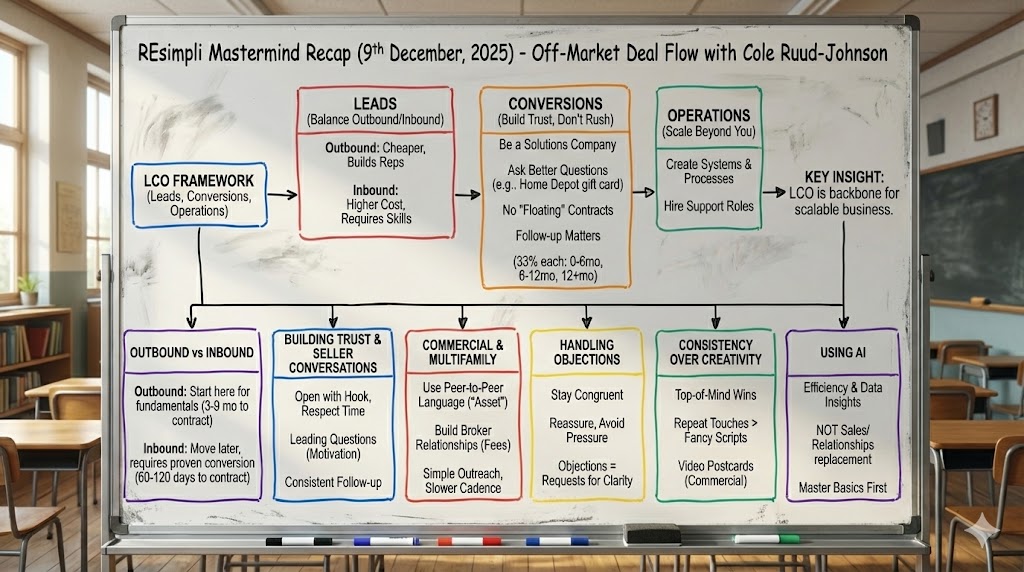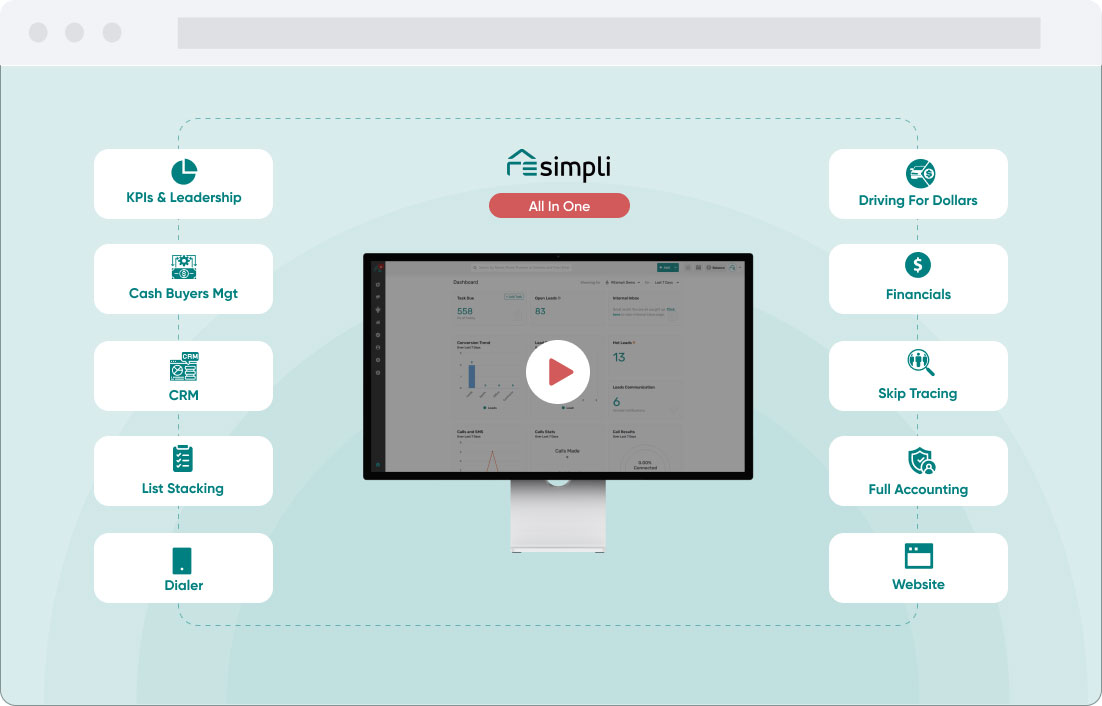When it comes to making calls, you might set daily, weekly, monthly, or yearly targets along with a goal of how many conversions you expect to make.
While making as many calls as possible is the key, an article in Pipeline.com advises against burnout. It warns that making too many calls can mean it’s harder to be effective.
Pro Investor Tip: Stop investing in separate apps and start investing in Real Estate. Use REsimpli as an all-in-one dependable CRM!
6 Best Dialers For Real Estate in 2025
To make your decision-making process smoother, we’ve curated a list of some of the best dialers tailored for real estate professionals, complete with features, pricing, and their respective features.
1. REsimpli Dialer
REsimpli’s dialer stands out as the ultimate solution for real estate investors who need efficient communication with leads and sellers. It’s fully integrated within the REsimpli CRM, which means you get a complete suite of features to track, manage, and close deals.
The REsimpli dialer offers an unbeatable advantage in terms of seamless integration, automation, and ease of use.
Key Features: Integrated with CRM, Auto Dialing, Call Tracking & Analytics, SMS and Voicemail Integration
2. Mojo Dialer
Mojo Dialer is one of the most widely used dialers for real estate professionals. It’s a favorite among agents because of its ease of use, fast dialing, and CRM integration. Mojo is specifically designed for cold calling and telemarketing campaigns.
Key Features: Triple Line Dialing, Lead Management, Campaign Automation, etc.
3. SmartPhone Dialer
SmartPhone Dialer is a mobile-friendly dialer that allows real estate professionals to make calls from anywhere.
Key Features: Real-Time Lead Updates, Customizable Settings, etc.
4. Mojo Dialer (Classic Version)
Mojo’s classic version remains a go-to for many real estate professionals who value its powerful yet simple dialer system. Mojo dialer helps increase outreach by dialing multiple numbers at the same time and keeping track of lead progress.
Key Features: Power Dialing, Lead Lists, Integrated CRM,
5. CallTools Dialer
CallTools is another option for real estate businesses that require fast contact with a large number of leads. It offers both predictive and power dialing options.
Key Features:
Predictive Dialing, Live Call Monitoringm, Call Recording, etc.
6. Kixie Dialer
Kixie is a versatile, cloud-based power dialer that relies on VoIP. It integrates with CRMs and automates follow-up calls
Key Features: Automated Call Logging, Call Automation, Instant Lead Follow-ups, etc.
What is a Dialer in Real Estate?
Put simply, a real estate dialer is a piece of software that eliminates the unhelpful stuff around calling for leads.
It removes the need for activities such as dialing numbers and call-logging as well as wiping out hold-ups like dialing wrong numbers, getting busy lines, or failed call attempts.
So what is the best dialer for real estate leads?
Well, that depends on what the agent needs. There are three main kinds of real estate dialers to choose from:
Auto Dialer – a single-line dialer eliminating the need to input the phone numbers manually.
Create lists of people to contact, then leave the auto-dialer to connect the agent with those prospects when they pick up the phone.
This is great for single realtors looking to up their call numbers and increase lead generation.
Predictive Dialer—a more sophisticated option, the predictive dialer will deal with multiple lines at once, even going so far as to analyze past calls and statistics to predict the average time it will take for the prospect to answer.
Perfect for reducing the idle time between calls, for agents with larger customer bases and for those working on one campaign together.
Power Dialer—does a lot of what a predictive dialer does, but it has the intelligence to pull out new leads from a CRM and then automatically dial and distribute calls.
Helps to reduce call abandonment and aids in contacting crucial leads in real time.
Advantages of Using Dialing Technology
Let’s go back to the hoarse-voiced agent we met earlier—they were making 40 calls a day on a good day and making two conversions.
While that is actually very good going, it’s worth remembering that agents are human beings with feelings, good days and bad days, and families.
Not to mention the fact that they’re in this job because they’re great at getting conversions thanks to their knowledge and natural ability, not solely for being the fastest dialers in the west.
So, what are the benefits available to our agent when they use a real estate dialer?
Boost conversion rates — by dialing correct numbers for people likely to answer, and logging those calls
Reduce human error — the best auto dialer for real estate investors will mean fewer wrong calls, increased productivity, reduced duplicate calls, and more fruitful conversations
Streamline the workflow — with a real estate CRM with dialer, everything is recorded into the CRM and actions like follow-ups are also noted.
Best Practices for Using a Real Estate Auto Dialer
How to Generate Leads for Real Estate Relies on a Dialer and Some Best Practices
So, the dialer is set up and ready to connect us with quality leads so we can have juicy conversations about real estate investments.
But even with a triple-line dialer and an intelligent CRM, an agent needs to be armed with some best practices—so what do they need to know ahead of their calls?
Understand the Law
There are several laws and related organizations that restrict telemarketers, including real estate agents, from becoming a nuisance to consumers.
The Telephone Consumer Protection Act (TCPA) has been in existence since 1991 to ensure that people don’t feel harassed by cold callers and to protect their privacy.
So, to start with, real estate auto-dialer calls are restricted to take place between 8 am and 9 pm.
Callers must immediately tell the recipient who they are, they cannot block their number, and they must ensure they’re not calling anyone on the Federal Communications Commission (FCC) Do Not Call Registry.
If they do, the agent could be fined up to $40,000 per call.
Prepare
Thanks to the real estate dialer, a real estate agent will now be speaking to more lucrative contacts more often, so they cannot freeze once the recipient picks up the phone.
A list is always recommended, including information about the prospect’s neighborhood and the area’s median listing price.
One can never go wrong with a script, no matter how long or short, and practice makes perfect, even before the call takes place.
Agents could even ask a keen friend or family member to go through the call with them so that they always sound natural and confident.
Don’t be too salesy
People hate feeling like they’re in a sales call—even when they know they are.
Combining the practice and preparation in point two with a dialer for real estate calls, agents should sound natural and easy in the information they are providing. Ideally, the conversation should be a two-way street.
The best agents listen to replies, make notes on the details, repeat the recipient’s words back to them, use their name naturally, show how they can help, and give them something they need or want.
Keeping thoughts like closing the deal far from the mind at this stage—and keeping goals shorter term, such as scheduling the date of the next call—will count as a win.
Set realistic targets
Setting a target will not only make life easier and the job more enjoyable; agents will also be able to attain more realistic goals when it comes to conversions and income.
So, the best approach for an agent setting calling targets would be to start by choosing how much they would like to earn this year.
They would then work out how that can be achieved based on the percentage split with their broker, by looking at the meridian cost of a property in their area.
From this, the agent will see how many conversions they need this year. Having a trustworthy CRM (Such as RESimpli) to analyze the conversion rate means a realistic call target can be achieved.
Have the confidence to guide
Once that lead picks up the phone, they are in the agent’s hands.
They need to be guided through the whole process with ease and confidence.
What will they get from this call? what can the agent do for them? what do they need to think about now? and when will they be called next?
A personable, memorable agent who shows them and gives them the information they need will make for a meaningful connection on a human level, as well as a business level.
Conclusion
The best dialer system is one that suits the agent’s specific needs.
There are three kinds—auto dialer, predictive dialer, and power dialer.
Using automation, all have the ability to take mistakes, false starts, and time-consuming elements away from cold calling.
But no matter which system the agent chooses for their business, it’s important to know the laws around telemarketing, have a prepared script, and talk naturally with leads.
Then they can watch the conversions roll in!
To truly excel in making the best out of every call, saving time and energy, and ensuring sales, use a dialer of an all-around fantastic CRM like REsimpli.
It’s designed by Real Estate Investors to help you fasten your growth, ease your business, and help you close more deals.


